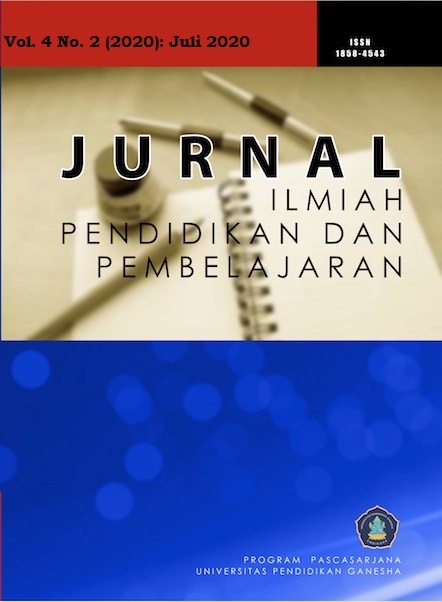DEVELOPMENT OF NATIONALISM ATTITUDES IN HISTORY LESSON OF 11TH- STUDENT: STUDY CASE IN MADANIA HIGH SCHOOL -PARUNG BOGOR INDONESIA
DOI:
https://doi.org/10.23887/jipp.v4i2.27747Abstract
This research aims to determine the contribution of history lessons to nationalism attitude in the students of grade 11 in Madania High School, Bogor. Besides, it is also to find patterns of character education development in the ideal of learning history, and the last is to find the obstacles faced by the teachers in building the character of Nationalism through learning history. The research was conducted using qualitative methods through in-depth interviews and questionnaires for the students of grade 11 and the history teacher at Madania High School, Parung, Bogor. The Nationalism Attitude is an attitude that shows the balance of love of the people in a country and the harmony of culture and territory contained in a nation to create and will defend the country both internally and externally. The subjects of this research were the history teacher and the students of grade 11 at Madania High School each from The department of Natural Sciences and Social Sciences and the research was conducted during January 2020 through March 2020 school year. The methods used in this research was a qualitative method and using a case study approach. Based on the results of observations and in-depth interviews with the history teacher and the students in grade 11 at Madania High School, it can be concluded by the researcher, the most prominent aspects of Nationalism are attitudes of love the motherland, honesty, responsibility, leadership, cooperation, and tolerance. Also, the 11th-grade students at Madania High School stated that the history teacher performance had been very good and had succeeded in instilling a nationalism attitude through history lessons. Besides, students also suggest for the future history teacher to make history lessons more interesting by adding role-playing lessons when studying a subject in a history book and to add state defending material in history lessons.
Keyword: Development, History lessons, Nationalism AttitudeReferences
Amiruddin. (2016). Peran Pendidikan Sejarah dalam Membangun Karakter Bangsa. Seminar Nasional Pendidikan Ilmu-Ilmu Sosial Membentuk Karakter Bangsa Dalam Rangka Daya Saing Global, SEMINAR NASIONAL “Pendidikan Ilmu-Ilmu Sosial Membentuk Karakter Bangsa Dalam Rangka Daya Saing Global” Kerjasama: Fakultas Ilmu Sosial Universitas Negeri Makassar dan Himpunan Sarjana Pendidikan Ilmu-ilmu Sosial Indonesia Grand Clarion Hotel, Makassar, 29 Oktober 2016.
Amirullah. (2016) Pentingnya Sejarah Dalam Pembinaan Karakter Bangsa Dan Pembangunan Nasional, SEMINAR NASIONAL “Pendidikan Ilmu-Ilmu Sosial Membentuk Karakter Bangsa Dalam Rangka Daya Saing Global” Kerjasama: Fakultas Ilmu Sosial Universitas Negeri Makassar dan Himpunan Sarjana Pendidikan Ilmu-ilmu Sosial Indonesia Grand Clarion Hotel, Makassar, 29 Oktober 2016.
Anika,Dina. (2017). Menemukan pola pengembangan pendidikan karakter dalam pembelajaran sejarah yang ideal. Jounal Educomic vol 5 no 2.
Doni KoesoemaA, Pendidikan Karakter: Strategi Mendidik Anak di Zaman Global, ( Jakarta: Grasindo, 2010), hal. 80
Fauzan, 2017. Penerapan Model Pembelajaran Living History Dalam Materi Sejarah Lokal Geger Cilegon 1888 Sebagai Upaya Membangun Nilai Patriotisme Siswa. Jurnal Pendidikan dan sejarah : Candrasangkala.
Kamisa.1997.Kamus LengkapBahasa Indonesia. Surabaya : Kartika.
Kementrian Pendidikan Nasional Badan dan Pengembangan Pusat Kurikulum. (2010). Pengembangan Pendidikan Budaya dan Karakter Bangsa (Pedoman Sekolah). Jakarta: Kementrian Pendidikan Nasional Badan dan Pengembangan Pusat Kurikulum. Johnmaxwell.com
Maxwell,2013 Going Beyond Talent : Four Cores Of Character. https://johnmaxwellteam.com/2017-living-your-values/
Miftah, 2013 Pengembangan Karakter Anak Melalui Pembelajaran Imu Sosial. Jurnal Pendidikan Karakter Tahun 3 nomor 2. (Sirnayatin, 2017)
Muhammad Azam, 2011 Nasionalisme Dan Ketahanan Budaya Di Indonesia.Yayasan Pustaka Obor Indonesia,2011
Pradita Jumardi, 2017)Mei.Silvi (2017). Peranan Pelajaran Sejarah Dalam Pengembangan Karakter Siswa Melalui Pembelajaran Sejarah Lokal di SMA Negeri 65 Jakarta Jakarta Barat. Jurnal Pendidikan Sejarah vol 6 nomer 2.
Republik Indonesia. (2003). Undang-Undang Republik Indonesia Nomor 20 Tahun 2003 tentang Sistem Pendidikan Nasional: Depdiknas.
Sirnayatin.Titin. Ariska. (2017).Membangun Karakter Bangsa Melalui Pembelajaran Sejarah, Jurnal SAP vol 1 no 3. (Sirnayatin, Membangun Karakter Bangsa Melalui Pembelajaran Sejarah, 2017)
Sugiyono, 2017 Metode Penelitian Kuantitatif, Kualitatif, dan R&D. Bandung : Alfabeta, CV.
Jacques S. Benninga and Edward A. Wynne, 1998 The Phi Delta Kappan, Vol. 79, No.6 (Feb., 1998), pp. 439-445, 448 Published by: Phi Delta Kappa International
Tukidi, 2011 Membangun Karakter Bangsa di Tengah-Tengah Budaya Global. Jurnal Forum Ilmu Sosial, Vol. 1 No. 38 Tahun 2011. 44-54.
Turmuzi, Ahmad. 2011. Peranan Pembelajaran Sejarah dalam Pembangunan Bangsa. Lombok Timur, Nusa Tenggara Timur. Tersedia. [Online]: http://edukasi.kompasiana.com/2011/09/20/pendidikan-budaya-dan-karakter-bangsa- implikasinya-dalam-dunia-pendidikan-ilmu-pengetahuan-sosial/
Permendiknas, 2007 Salinan Lampiran Peraturan Menteri Pendidikan Nasional Nomor 6, 4 Mei 2007 Standar Kualifikasi Akademik dan Kompetensi guru http://vervalsp.data.kemdikbud.go.id/prosespembelajaran/filepermendiknas%20No%2016%20tahun%202007.pdf, n.d.)
Downloads
Published
How to Cite
Issue
Section
License
Authors who publish with the Jurnal Ilmiah Pendidikan dan Pembelajaran (JIPP) agree to the following terms:
- Authors retain copyright and grant the journal the right of first publication with the work simultaneously licensed under a Creative Commons Attribution License (CC BY-SA 4.0) that allows others to share the work with an acknowledgment of the work's authorship and initial publication in this journal.
- Authors are able to enter into separate, additional contractual arrangements for the non-exclusive distribution of the journal's published version of the work (e.g., post it to an institutional repository or publish it in a book), with an acknowledgment of its initial publication in this journal.
- Authors are permitted and encouraged to post their work online (e.g., in institutional repositories or on their website) prior to and during the submission process, as it can lead to productive exchanges, as well as earlier and greater citation of published work. (See The Effect of Open Access)










